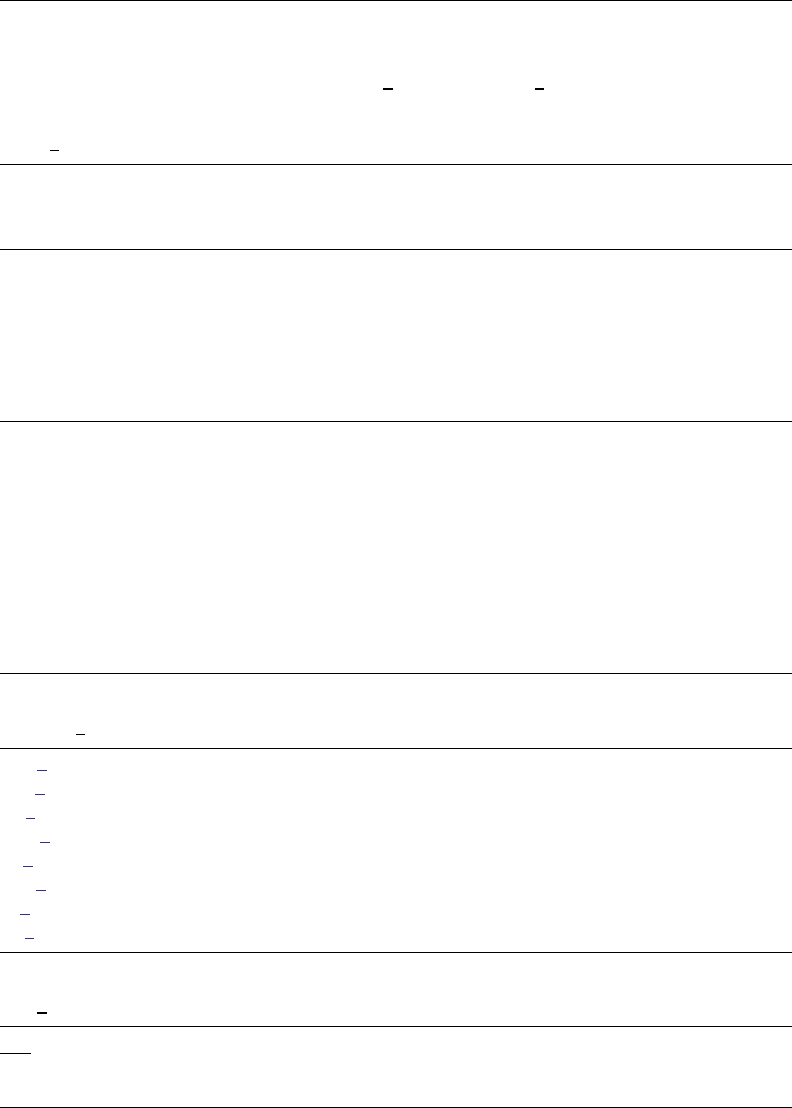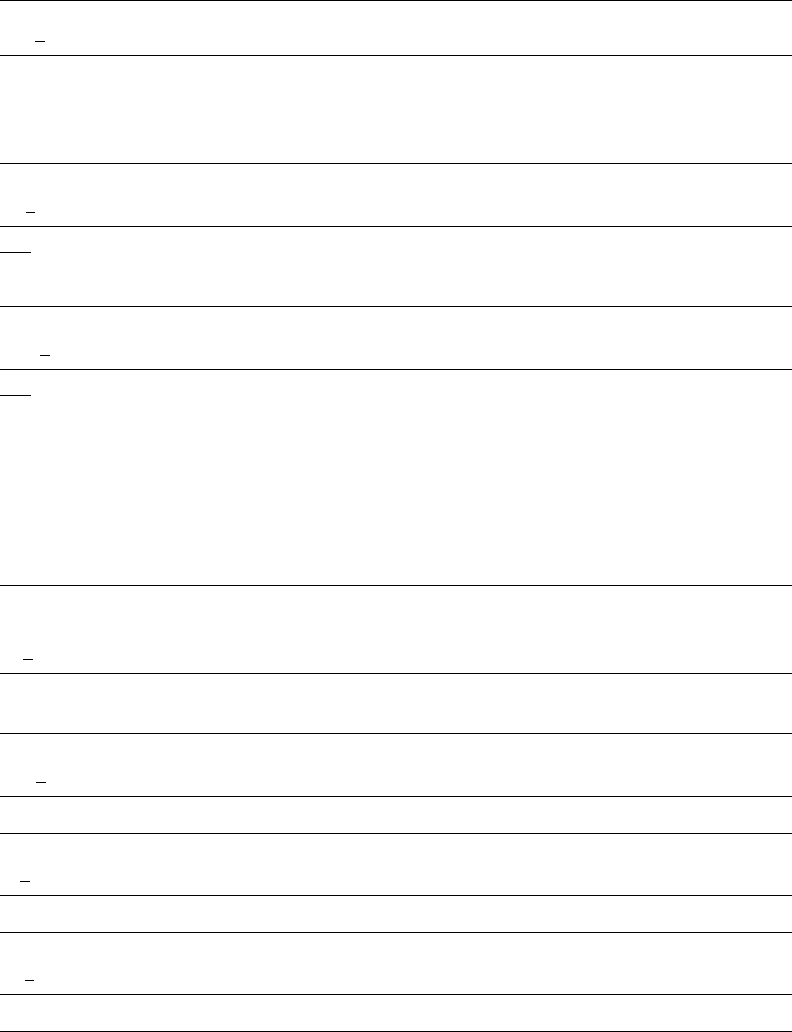
Title stata.com
collect export — Export table from a collection
Description Quick start Menu Syntax Options
Remarks and examples Stored results Also see
Description
collect export exports a table from a collection to a specified document type.
You can also include a table in a report created by putdocx, putpdf, or putexcel; see
[RPT] putdocx collect, [RPT] putpdf collect, and [RPT] putexcel.
Quick start
Export a table from the current collection to myfile.xlsx
collect export myfile.xlsx
Export a table from the collection c2 to myfile2.xlsx
collect export myfile2.xlsx, name(c2)
Same as above, but export the table to sheet Table1, instead of the default Sheet1
collect export myfile2.xlsx, name(c2) sheet(Table1)
Export a table from the current collection to table1.docx, replacing the file if it exists
collect export table1.docx, replace
Same as above, and save the putdocx commands used to export the table in table1.do
collect export table1.docx, replace dofile(table1)
Export a table from the current collection to table1.tex
collect export table1.tex
Same as above, but export the table only, instead of creating a complete L
A
T
E
X document
collect export table1.tex, tableonly
Menu
Statistics > Summaries, tables, and tests > Tables and collections > Build and style table
1

2 collect export — Export table from a collection
Syntax
collect export filename.suffix
, export options document options
export options Description
name(cname) export collection cname
as(fileformat) specify document type
replace overwrite existing file
By default, collect export will try to determine the document type from suffix using the following
table:
Implied
suffix option File type
docx as(docx) Microsoft Word
html as(html) HTML 5 with CSS
pdf as(pdf) PDF (Portable Document Format)
xlsx as(xlsx) Microsoft Excel 2007/2010 or newer
xls as(xls) Microsoft Excel 1997/2003
tex as(latex) L
A
T
E
X
smcl as(smcl) SMCL (Stata Markup and Control Language)
txt as(txt) plain text
markdown as(markdown) Markdown
md as(markdown) Markdown
document options Description
docx options when exporting to .docx files
html options when exporting to .html files
pdf options when exporting to .pdf files
excel options when exporting to .xls and .xlsx files
tex options when exporting to .tex files
smcl option when exporting to .smcl files
txt option when exporting to .txt files
md option when exporting to .markdown and .md files
docx options Description
noisily show the putdocx commands used to export to the .docx file
dofile(filename
, replace
) save the putdocx commands used for exporting to the named
do-file

collect export — Export table from a collection 3
html options Description
prefix(prefix) use prefix to identify style classes
cssfile(cssfile) define the styles in cssfile instead of filename
tableonly export only the table to the specified file
append append to an existing file
pdf options Description
noisily show the putpdf commands used to export to the PDF file
dofile(filename
, replace
) save the putpdf commands used for exporting to the named
do-file
excel options Description
noisily show the putexcel commands used to export to the Excel file
dofile(filename
, replace
) save the putexcel commands used for exporting to
the named do-file
cell(cell) specify the Excel upper-left cell as the starting position to
export the table; the default is cell(A1)
modify modify Excel file
sheet(sheetname
, replace
) specify the worksheet to use; the default sheet name
is Sheet1
noopen do not open Excel file in memory
noopen does not appear in the dialog box.
tex options Description
tableonly export only the table to the specified file
append append to an existing file
smcl option Description
append append to an existing file
txt option Description
append append to an existing file
md option Description
append append to an existing file

4 collect export — Export table from a collection
Options
Options are presented under the following headings:
export options
docx options
html options
pdf options
excel options
tex options
smcl option
txt option
md option
export options
name(cname) specifies a collection to export instead of the current collection.
as(fileformat) specifies the file format to which the collection is to be exported. This option is rarely
specified because, by default, collect export determines the format from the suffix of the file
being created.
replace permits collect export to overwrite an existing file.
docx options
noisily specifies that collect export show the putdocx commands used to export to the .docx
file.
dofile(filename
, replace
) specifies that collect export save to filename the putdocx
commands used to export to the .docx file. If filename already exists, it can be overwritten by
specifying replace. If filename is specified without an extension, .do is assumed.
html options
prefix(prefix) specifies that collect export use prefix to identify style classes for the exported
HTML table.
cssfile(cssfile) specifies that collect export define the styles in cssfile instead of filename.
tableonly specifies that only the table be exported to the specified file. With this option, the produced
file may be included in other HTML documents. By default, collect export produces a complete
HTML document.
If option cssfile() is not specified, a CSS filename is constructed from filename, with the
extension replaced with .css.
append specifies that collect export append the table to an existing file.
This option implies option tableonly.
If the target CSS file already exists, collect export will also append to it.

collect export — Export table from a collection 5
pdf options
noisily specifies that collect export show the putpdf commands used to export to the PDF file.
dofile(filename
, replace
) specifies that collect export save to filename the putpdf com-
mands used to export to the PDF file. If filename already exists, it can be overwritten by specifying
replace. If filename is specified without an extension, .do is assumed.
excel options
noisily specifies that collect export show the putexcel commands used to export to the .xls
or .xlsx file.
dofile(filename
, replace
) specifies that collect export save to filename the putexcel
commands used to export to the .xls or .xlsx file. If filename already exists, it can be
overwritten by specifying replace. If filename is specified without an extension, .do is assumed.
cell(cell) specifies an Excel upper-left cell as the starting position to publish the table. The default
is cell(A1).
modify permits putexcel set to modify an Excel file. For more information about this option, see
[RPT] putexcel.
sheet(sheetname
, replace
) saves to the worksheet named sheetname. For more information
about this option, see [RPT] putexcel.
noopen prevents collect export from using option open in the call to putexcel set.
By default, collect export uses the putexcel set option open to open the Excel file in
memory for modification. This tends to improve the speed of the export if many cells or style
edits are in the collection. For more information about the open option, see [RPT] putexcel.
noopen is necessary only when you need to force collect export to produce do-files as it did
when collect export was first introduced in Stata 17.
tex
options
tableonly specifies that only the table be exported to the specified file. With this option, the produced
file may be included in other L
A
T
E
X documents via the \input or \include macro.
append specifies that collect export append the table to an existing file.
This option implies option tableonly.
smcl option
append specifies that collect export append the table to an existing file.
txt option
append specifies that collect export append the table to an existing file.

6 collect export — Export table from a collection
md option
append specifies that collect export append the table to an existing file.
Remarks and examples stata.com
Remarks are presented under the following headings:
Introduction
Styles for different documents
Creating more extensive documents
Introduction
One goal of creating a customized table may be to present your findings to others. With collect
export, you can export a collection to a variety of file types. For example, after creating a table
from a collection of results and making styling edits to obtain the look you want, you can export a
table from the current collection to an Excel file by typing the following:
. collect export myfile.xlsx
By specifying the .xlsx suffix, we have indicated that we want to export our work to a Microsoft
Excel file. Equivalently, we could have instead specified the document type as follows:
. collect export myfile, as(xlsx)
Either way, we would have exported a table from the current collection to the file myfile.xlsx.
Styles for different documents
The collect suite of commands has many formatting features that can be applied to any collection
of results, regardless of the document you may be exporting your table to. For example, you may
specify the numeric formatting for your results or modify the labels for the dimensions. But there
are also some style specifications that are specific to the type of document you will be exporting to.
For example, you can use collect style html to specify whether adjacent cell borders should be
collapsed in the resulting HTML file. If you will be exporting a table to a .docx or .pdf file, you
can see collect style putdocx and collect style putpdf for some style specifications specific
to those types of documents.
Additionally, you can add a custom table title with collect title and notes with collect
notes. These commands add the title and notes in plain text, but you can specify the appearance
style for the title and notes, respectively, with collect style title and collect style notes.
Certain appearance edits can be rendered only on certain types of documents. For example, you can
specify the font size and color if you will export your table to a Microsoft Excel, an HTML, or a
L
A
T
E
X file.
Creating more extensive documents
With collect export, you can export a customized table to the file format of your choice. If
you are exporting to an HTML, a L
A
T
E
X, a SMCL, a Markdown, or a plain-text file, you can export
multiple tables to a single file with the append option. But you may want to create documents with
more than these customized tables.

collect export — Export table from a collection 7
For example, when you export a table to an HTML or a L
A
T
E
X file, collect export creates a
complete document with the table from the current collection. If you want to incorporate this table
in a more extensive document, you can use the tableonly option to export just the table to the
specified file.
Additionally, suppose that you wish to export your table to a .docx or .pdf file but you want
that table to be part of a report that also includes graphs, text, and other results from Stata. By using
the putdocx and putpdf suites, you can incorporate the customized table in the active document
with putdocx collect and putpdf collect.
Similarly, if you want to create an Excel file with the table from the current collection and other
Stata results or graphs, you can incorporate the table in the active Excel file by using the collect
output type with putexcel.
Stored results
collect export stores the following in s():
Macros
s(filename) name of the file
s(collection) name of collection
s(noisily) 1 if option noisily specified, 0 otherwise
s(dofile) name of the new do-file
s(cssfile) name of the new css-file
Also see
[TABLES] collect style html — Collection styles for HTML files
[TABLES] collect style putdocx — Collection styles for putdocx
[TABLES] collect style putpdf — Collection styles for putpdf
[RPT] putdocx collect — Add a table from a collection to an Office Open XML (.docx) file
[RPT] putexcel — Export results to an Excel file
[RPT] putpdf collect — Add a table from a collection to a PDF file
Stata, Stata Press, and Mata are registered trademarks of StataCorp LLC. Stata and
Stata Press are registered trademarks with the World Intellectual Property Organization
of the United Nations. StataNow and NetCourseNow are trademarks of StataCorp
LLC. Other brand and product names are registered trademarks or trademarks of their
respective companies. Copyright
c
1985–2023 StataCorp LLC, College Station, TX,
USA. All rights reserved.
®
For suggested citations, see the FAQ on citing Stata documentation.
